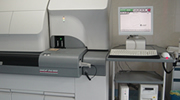【Warm Doctor Essay Solicitation】Pathologist with Penetrating Insight
Hits: 3120 Time: 2020-07-01
Someone asked me what’s my job, I said I was a doctor. Then asked me what was my department? I said I was a pathologist. But every time I felt regret after saying like that. For it would cause misunderstanding. What did pathologist do? Examination? B-ultrasound? I was at a loss too. I didn’t know how to explain to make one without medical background to understand what kind of job was pathologist. But I never regretted about my choice from college graduation till now. Because I know I’m a dancer on tool nose, doctor of doctor. Why am I saying like this? Because the clinical doctors are facing various diseases, the pathologists are continuously conducting identifications and screenings to urgently and accurately tell them about differences between these diseases, so that they could conduct correct treatments. Therefore, an ordinary pathologist often shine off a dazzling light.
A common afternoon in 2019, the sun was gently shining on earth. Our pathologists were reading the films with microscope as usual, suddenly an uncomfortable signal entered into our view. Why was the gastric mucosa glands were so badly arrayed under the microscope, but the cellular morphology was as gentle as the sunshine, without any malice at all. After repeatedly reading for many times at HPF and LPF, the only malice found was from the array of glands. What’s the reason caused this, the healthy gastric mucosa? Inflammation? Tumor? Doubts were heaviy covering her thoughts, and she was totally puzzled. Then she dialed the phone number of the patient’s supervising doctor to know about the gastroscopic situation, clinical records, symptoms and physical signs, etc, and leart that the patient had a history of colonic adenoma, without other special conditions, and the gastric mucosa lesions were pending for pathological examination. This doctor submitted the slices to the superior physician Director Peng Fang for group consultation after inquiring the supervising doctor in vain. As a senior chief physician, Director Peng was also the first time to see such leisons. They highly doubted the possibility of fundus adenocarcinoma after referring to plenty of materials and literatures, it’s a very new lesion, which was first proposed by the Japanese professor, and it’s very similar to the benigh lesion, and it’s easy to be overlooked. Currently, a common ground about this highly-differentiated gland cancer was still not reached at the domestic pathology field, and even many senior experts didn’t know this lesion. It’s said by literatures that there were two immunolabellings cpable of assisting diagnosisi of this disease. But it’s not available at our department, and the reagent supplier of our department could not send goods to us quickly. At that moment, because the patient was normal in various indicators, and was already discharged to wait for the pathological report. Facing such a situation, undoubtedly the most effective solution was that we contacted our peers directly. Director Peng Fang immediately and continuously called many major hospitals within the province, and finally found the two antibodies, and they agreed to help us make the labeling without charge. Our department immediately sent staff to deliver the slices over there. The labeling results supported the diagnosis of fundus adenocarcinoma. Although we had no experience and there were too much pressure for us to make diagnosis directly. The clinical doctors and patient may not accept such a result beyond their expectations. But Director Peng finally wroten down the diagnosis of “fundus adenocarcinoma” on the report. It’s a pity that the patient never came back for further treatment after receiving the report. So it went over. Our pathological work also recovered to its calmness. This is our work, without flowers, without applauses and without echoes.
But sometimes there are also surprises for the pathologists. Just several months later after that incident, which was almost forgotten. Once when Director Peng attended a pathological meeting in the province, a pathological doctor from a large hospital held her hands and enthsiastically and feelingly said, “thank you very much!” This sudden thanks made Director Peng at a loss. She learned after further talks that patient went to their hospital for diagnosis, and did another gastroscopic examination, the preliminary examination doctor didn’t notice that lesion and sent the clinical doctor the inflammation report. The clinical doctor noticed two totally different results from two hospitals within a short interval and doubted about that result, so later he contacted the Pathology Department. They also took group consultation and discussions, and they drew the same conclusion with our hospital after immunolabelling. Mucosa dissection under gastroscopy was immediately done for the patient, and the lesion was totally removed, and it’s proven to be fundus adenocarcinoma. We belive the post-operational life of the patient will be in a high quality since an early and well-differnetiated cancer with a good prognosis is treated like this. Due to our correct preliminary diagnosis, a medical misdiagnosis was timely saved, and as a result the patient was timely and effectively treated.
This is the pathologist——we are common, but must practise an penetrating insight. Although the patients don’t know what’s our role, but the pathologists are dedicatedly serving the patients everyday; although the clinical doctors are doubting about our report level, we are still perseverely making the reports perfect; although we are slow in delivering the report, we are escorting life by every link and step.





